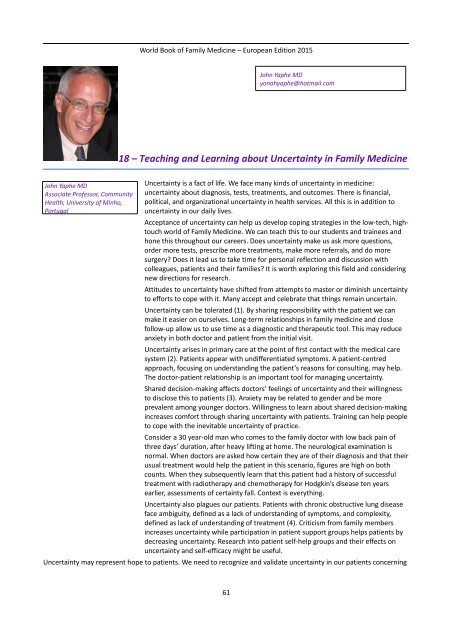Family Medicine
World Book 2015
World Book 2015
Create successful ePaper yourself
Turn your PDF publications into a flip-book with our unique Google optimized e-Paper software.
World Book of <strong>Family</strong> <strong>Medicine</strong> – European Edition 2015<br />
John Yaphe MD<br />
yonahyaphe@hotmail.com<br />
18 – Teaching and Learning about Uncertainty in <strong>Family</strong> <strong>Medicine</strong><br />
John Yaphe MD<br />
Associate Professor, Community<br />
Health, University of Minho,<br />
Portugal<br />
Uncertainty is a fact of life. We face many kinds of uncertainty in medicine:<br />
uncertainty about diagnosis, tests, treatments, and outcomes. There is financial,<br />
political, and organizational uncertainty in health services. All this is in addition to<br />
uncertainty in our daily lives.<br />
Acceptance of uncertainty can help us develop coping strategies in the low-tech, hightouch<br />
world of <strong>Family</strong> <strong>Medicine</strong>. We can teach this to our students and trainees and<br />
hone this throughout our careers. Does uncertainty make us ask more questions,<br />
order more tests, prescribe more treatments, make more referrals, and do more<br />
surgery? Does it lead us to take time for personal reflection and discussion with<br />
colleagues, patients and their families? It is worth exploring this field and considering<br />
new directions for research.<br />
Attitudes to uncertainty have shifted from attempts to master or diminish uncertainty<br />
to efforts to cope with it. Many accept and celebrate that things remain uncertain.<br />
Uncertainty can be tolerated (1). By sharing responsibility with the patient we can<br />
make it easier on ourselves. Long-term relationships in family medicine and close<br />
follow-up allow us to use time as a diagnostic and therapeutic tool. This may reduce<br />
anxiety in both doctor and patient from the initial visit.<br />
Uncertainty arises in primary care at the point of first contact with the medical care<br />
system (2). Patients appear with undifferentiated symptoms. A patient-centred<br />
approach, focusing on understanding the patient’s reasons for consulting, may help.<br />
The doctor-patient relationship is an important tool for managing uncertainty.<br />
Shared decision-making affects doctors’ feelings of uncertainty and their willingness<br />
to disclose this to patients (3). Anxiety may be related to gender and be more<br />
prevalent among younger doctors. Willingness to learn about shared decision-making<br />
increases comfort through sharing uncertainty with patients. Training can help people<br />
to cope with the inevitable uncertainty of practice.<br />
Consider a 30 year-old man who comes to the family doctor with low back pain of<br />
three days’ duration, after heavy lifting at home. The neurological examination is<br />
normal. When doctors are asked how certain they are of their diagnosis and that their<br />
usual treatment would help the patient in this scenario, figures are high on both<br />
counts. When they subsequently learn that this patient had a history of successful<br />
treatment with radiotherapy and chemotherapy for Hodgkin’s disease ten years<br />
earlier, assessments of certainty fall. Context is everything.<br />
Uncertainty also plagues our patients. Patients with chronic obstructive lung disease<br />
face ambiguity, defined as a lack of understanding of symptoms, and complexity,<br />
defined as lack of understanding of treatment (4). Criticism from family members<br />
increases uncertainty while participation in patient support groups helps patients by<br />
decreasing uncertainty. Research into patient self-help groups and their effects on<br />
uncertainty and self-efficacy might be useful.<br />
Uncertainty may represent hope to patients. We need to recognize and validate uncertainty in our patients concerning<br />
61


